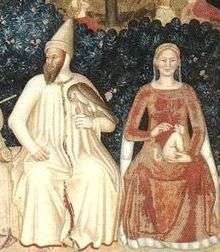Taddea Visconti
| Taddea Visconti | |
|---|---|
| Duchess of Bavaria | |
| Born |
1351 Milan, Italy |
| Died |
28 September 1381 Munich, Germany |
| Noble family | Visconti |
| Spouse(s) | Stephen III, Duke of Bavaria |
| Issue | |
| Father | Bernabò Visconti, Lord of Milan |
| Mother | Beatrice Regina della Scala |
Taddea Visconti, Duchess of Bavaria (1351 – 28 September 1381) was an Italian noblewoman of the Visconti family, the ruling house in Milan from 1277 to 1447. She was the first wife of Stephen III, Duke of Bavaria, and the mother of the French queen Isabeau of Bavaria.[1]
Early life

Born in Milan in 1351, sometime after 27 June, Taddea was the eldest child of Bernabò Visconti, Lord of Milan, and Beatrice Regina della Scala (1331–18 June 1384).[2] She had sixteen younger siblings, but she was her parents' favorite child. Her paternal grandparents were Stefano Visconti, Lord of Milan, and Valentina Doria, and her maternal grandparents were Mastino II della Scala and Taddea da Carrara.
Taddea's father Bernabò, continually at war with the papacy (for which he was excommunicated), was a ruthless despot,[3] who would, in 1385, be overthrown by his nephew and son-in-law Gian Galeazzo Visconti and later poisoned in the castle of Trezzo.[4]
Marriage
Bavaria was the wealthiest and most powerful of the German states at the time. Bernabò managed to secure the marriages of four of his children to members of the ruling Wittelsbach family. Taddea, being the eldest, was the first of the four Visconti children selected.
In 1367, Taddea became the first wife of Stephen III of Bavaria-Ingolstadt, who, on 13 May 1375, became Duke of Bavaria. He ruled jointly with his brothers, Frederick (who married Taddea's younger sister Maddalena) and John II, in Bavaria-Landshut. Taddea brought a dowry of 100,000 gold ducats.[5] Her husband Stephen (who was 14 years older than her) is described by historian Barbara Tuchman as "reckless, prodigal, ostentatious, amorous, restless without a tournament or war and well-suited to a Visconti daughter".[6]
The marriage produced three children:
- Louis VII, Duke of Bavaria (c. 1368–2 May 1447), married firstly Anne de Bourbon, by whom he had issue, and secondly, Catherine d'Alençon. He had several illegitimate children by various mistresses.
- Isabeau of Bavaria, (early 1370–24 September 1435), Queen consort of King Charles VI of France, whom she married on 17 July 1385.
- unnamed son (born and died in 1377)
Adjustment to life in Bavaria proved a difficult challenge for Taddea, prompting her, in later years, to take extended journeys abroad. The climate of Munich did not prove healthy for her, and she developed a persistent cough and recurring fever. After Stephen III became duke, Taddea was required to attend more state functions, her health notwithstanding. In the 1370s, she began to pay long visits to her homeland, usually bringing her husband and children with her, and stopping at Milan to visit her family. She visited Rome in 1378.
Death and legacy
After a trip to Milan in December 1380, Taddea fell seriously ill. By the time she returned to Bavaria, she was suffering from fever, coughing and weight loss. Her health continued to fail and she died on 28 September 1381 in Munich at the age of 30. She was buried in Unsere Liebe Frau.[7] When news of her death reached Milan, her devastated father ordered his subjects to wear mourning clothes. Less than four years later, her daughter, Isabeau, became Queen of France. Taddea's husband Stephen married secondly, on 16 January 1401, Elisabeth of Cleves, daughter of Count Adolf III of Cleves. This second marriage was childless.
Ancestry
| Ancestors of Taddea Visconti | ||||||||||||||||||||||||||||||||||||||||||||||||||||||||||||||||||||||||||||||||||||||||||||||||||||||||||||||||||||||||||||||||||||||||||||||||||||||||||||||||||||||||||||||||||||||||||||||||||||||||||||||||||||||||||||||||||||||||||||||||||||||||||||||||||||||||||||||||||||||||||||||||||||||||||||||||||||||||||||||||||||||||||||||||||||||||||||||||||||||||||||||||||||||||||||||||||||||||||||||||||||||||||||||||||||||||||||||||||||||||||||||||||||||||||||||||||||||||||||||||||||||||||||||||||||||||||||||||||||||||||||||||||||||||||||||||||||||||||||||||||||||||||||||||||||||||||||||||
|---|---|---|---|---|---|---|---|---|---|---|---|---|---|---|---|---|---|---|---|---|---|---|---|---|---|---|---|---|---|---|---|---|---|---|---|---|---|---|---|---|---|---|---|---|---|---|---|---|---|---|---|---|---|---|---|---|---|---|---|---|---|---|---|---|---|---|---|---|---|---|---|---|---|---|---|---|---|---|---|---|---|---|---|---|---|---|---|---|---|---|---|---|---|---|---|---|---|---|---|---|---|---|---|---|---|---|---|---|---|---|---|---|---|---|---|---|---|---|---|---|---|---|---|---|---|---|---|---|---|---|---|---|---|---|---|---|---|---|---|---|---|---|---|---|---|---|---|---|---|---|---|---|---|---|---|---|---|---|---|---|---|---|---|---|---|---|---|---|---|---|---|---|---|---|---|---|---|---|---|---|---|---|---|---|---|---|---|---|---|---|---|---|---|---|---|---|---|---|---|---|---|---|---|---|---|---|---|---|---|---|---|---|---|---|---|---|---|---|---|---|---|---|---|---|---|---|---|---|---|---|---|---|---|---|---|---|---|---|---|---|---|---|---|---|---|---|---|---|---|---|---|---|---|---|---|---|---|---|---|---|---|---|---|---|---|---|---|---|---|---|---|---|---|---|---|---|---|---|---|---|---|---|---|---|---|---|---|---|---|---|---|---|---|---|---|---|---|---|---|---|---|---|---|---|---|---|---|---|---|---|---|---|---|---|---|---|---|---|---|---|---|---|---|---|---|---|---|---|---|---|---|---|---|---|---|---|---|---|---|---|---|---|---|---|---|---|---|---|---|---|---|---|---|---|---|---|---|---|---|---|---|---|---|---|---|---|---|---|---|---|---|---|---|---|---|---|---|---|---|---|---|---|---|---|---|---|---|---|---|---|---|---|---|---|---|---|---|---|---|---|---|---|---|---|---|---|---|---|---|---|---|---|---|---|---|---|---|---|---|---|---|---|---|---|---|---|---|---|---|---|---|---|---|---|---|---|---|---|---|---|---|---|---|---|---|---|---|---|---|---|---|---|---|---|---|---|---|---|---|---|---|---|---|---|---|---|---|---|---|---|---|---|---|---|---|---|---|---|---|---|---|---|---|---|---|---|---|---|---|---|---|---|---|---|---|---|---|---|---|---|---|---|---|---|---|---|---|---|---|---|---|---|---|---|---|---|---|---|---|---|---|---|---|---|---|---|---|---|---|---|---|---|---|---|---|---|---|---|---|---|---|---|---|---|---|---|---|---|---|---|---|---|---|---|---|---|---|---|---|---|---|---|---|---|---|---|---|---|---|---|---|---|---|---|---|---|---|---|---|---|---|---|---|---|---|---|---|---|---|---|---|---|
| ||||||||||||||||||||||||||||||||||||||||||||||||||||||||||||||||||||||||||||||||||||||||||||||||||||||||||||||||||||||||||||||||||||||||||||||||||||||||||||||||||||||||||||||||||||||||||||||||||||||||||||||||||||||||||||||||||||||||||||||||||||||||||||||||||||||||||||||||||||||||||||||||||||||||||||||||||||||||||||||||||||||||||||||||||||||||||||||||||||||||||||||||||||||||||||||||||||||||||||||||||||||||||||||||||||||||||||||||||||||||||||||||||||||||||||||||||||||||||||||||||||||||||||||||||||||||||||||||||||||||||||||||||||||||||||||||||||||||||||||||||||||||||||||||||||||||||||||||
References
- ↑ Charles Cawley, Medieval Lands, Dukes of Bavaria
- ↑ Cawley, Medieval Lands, Lords of Milan, Visconti
- ↑ Barbara Tuchman, A Distant Mirror, p. 254, published by Alfred A Knopf, New York, 1978
- ↑ Barbara Tuchman, A Distant Mirror,ps.437-438
- ↑ Barbara Tuchman, A Distant Mirror, p. 436.
- ↑ Barbara Tuchman, A Distant Mirror, pages 436-437
- ↑ Cawley, Medieval Lands, Dukes of Bavaria.
Sources
- Cawley, Charles. "Dukes of Bavaria". Medieval Lands.
- Cawley, Charles. "Lords of Milan, Visconti". Medieval Lands.
- Tuchman, Barbara (1978). A Distant Mirror. New York: Alfred A. Knopf.
| Preceded by Katharine of Bohemia (United Bavaria) |
Duchess of Bavaria-Ingolstadt With Maddalena Visconti 1375–1381 |
Succeeded by Elisabeth of Cleves |